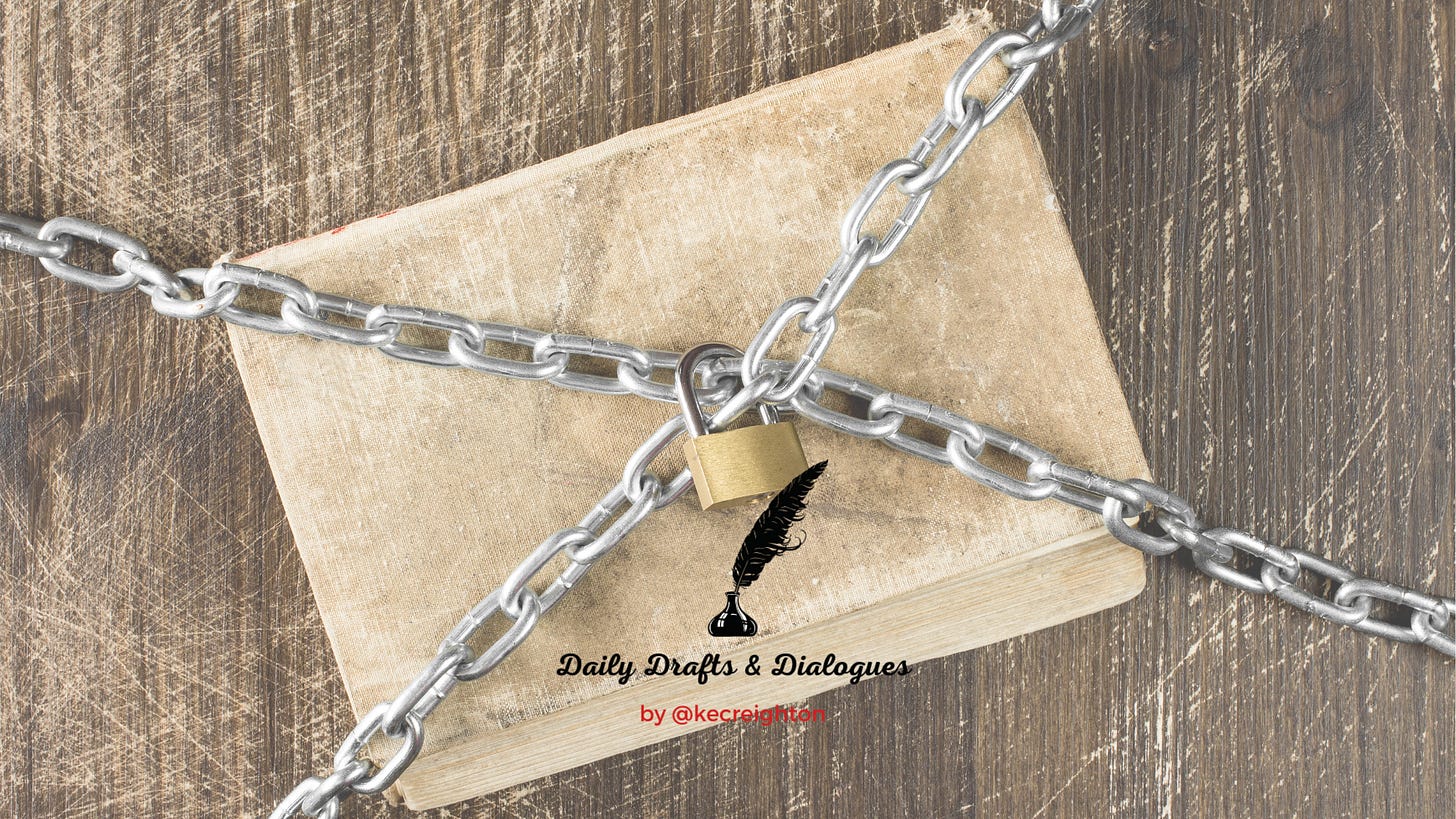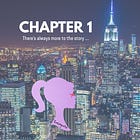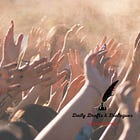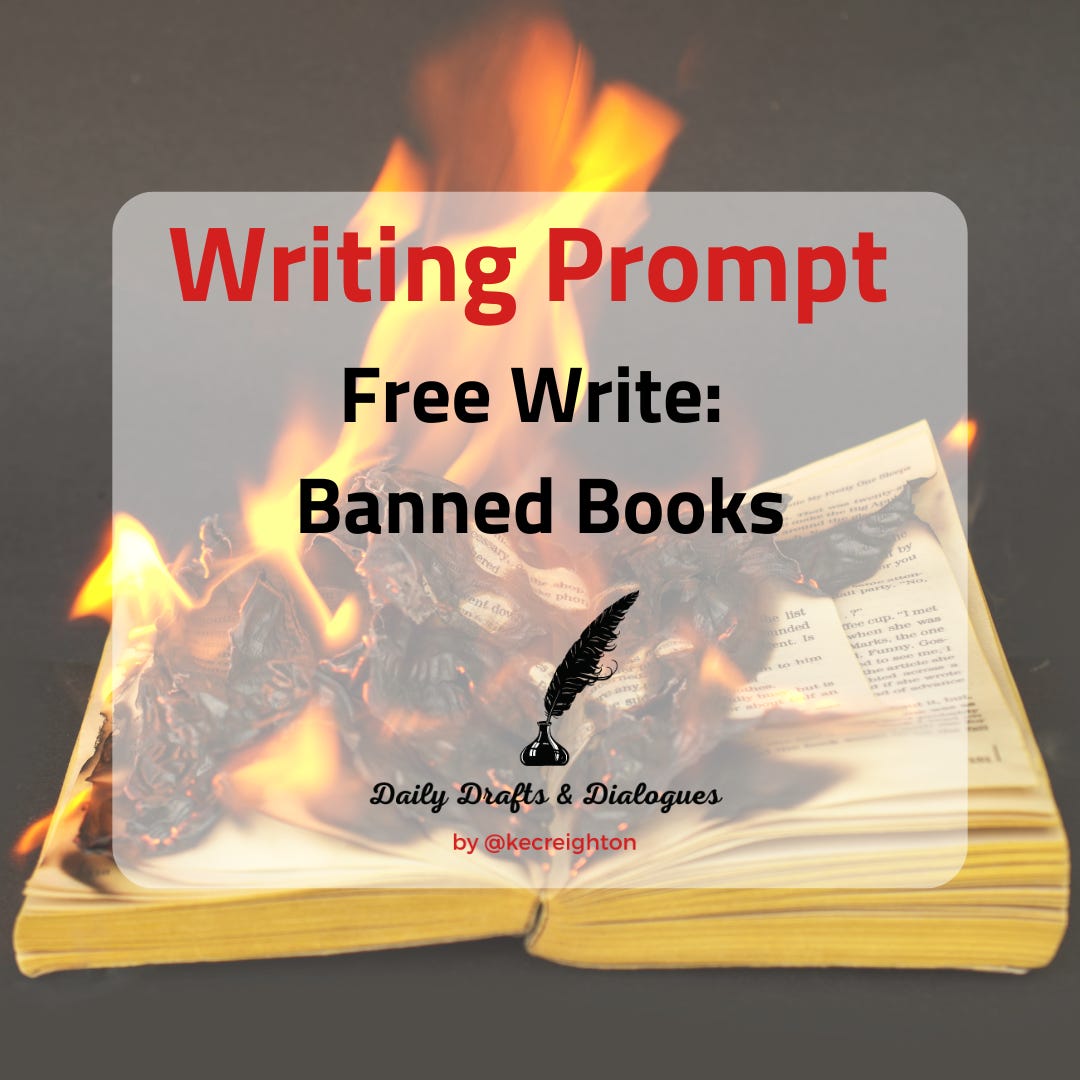RE: Banned Books Week
Banned Books Week isn’t over yet! Keep reading, then leave a comment to join this dialogue. And don’t forget to check out today’s writing prompt at the bottom of this post.
If you support free speech, intellectual freedom, and the ability to access whatever you want to read, you will want to be aware of Banned Books Week this year, which is taking place this week (October 5th-11th). Though supporting banned books should continue year-round, of course.
Banned Books Week was established in 1982 in response to a growing number of book bans and book challenges across the US, which is only increasing in recent years. Its aim is to bring together the entire book community (librarians, publishers, authors, readers, book sellers, etc.) in shared support of the freedom to read.
This year’s theme is ‘Censorship Is So 1984. Read for Your Rights,’ and includes the disclaimer: “With the escalation in attempts to ban books in libraries, schools, and bookstores around the country, George Orwell’s cautionary tale 1984 serves a prescient warning about the dangers of censorship. This year’s theme reminds us that the right to read belongs to all of us, that censorship has no place in contemporary society, and that we must defend our rights.” (Please be sure to read more about Banned Books Week and why it’s so important to spread awareness after you read this post.)
Did you know these numbers and stats related to banned books?
Last year, 2,452 unique titles were challenged, the third highest number ever documented by ALA (American Library Association), significantly exceeding the annual average of 273 unique titles over the period from 2001–2020. (source)
Prior to 2020, the vast majority of challenges to library books and resources were brought by a single parent who sought to remove or restrict access to a book their child was reading. Recent censorship data are evidence of a well-organized movement, the goals of which include removing books about race, history, gender identity, sexuality, and reproductive health from US public and school libraries. (source)
Nearly 72% of censorship attempts in 2024 were initiated by pressure groups and decision makers who have been swayed by them. (source)
Pressure groups and government entities that include elected officials, board members, and administrators initiated 72% of demands to censor books in school and public libraries. (source)
The states with the most bans are Florida: 2,304; Texas: 1,781; Tennessee: 1,622 (source)
13 states have passed anti-book-ban laws. At least 19 more states have introduced anti-book-ban legislation since Illinois passed the first such law in 2023. (source)
596 book titles were pulled from shelves in Department of Defense schools serving military children worldwide this year. (source)
101 is the room number of the re-education chamber in George Orwell’s classic novel 1984 where dissenters are tortured with their worst fears. Orwell took the number from a conference room at the BBC’s Broadcasting House, where he worked to broadcast British propaganda in India from 1941 to 1943. (source)
The ALA’s Office for Intellectual Freedom acknowledges that a significant number of book challenges go unreported, citing research that “for each challenge reported there are as many as four or five which go unreported.” Surveys indicate that 82-97% of book challenges remain unreported and receive no media coverage. (source)
47% of the books targeted for censorship were titles representing the voices and lived experiences of LGBTQIA+ and BIPOC individuals. (source)
What can you do to fight book bans?
Share this easy-to-follow post you’re currently reading to help build awareness.
Buy banned books from anywhere and everywhere ASAP. They don’t have to be brand-new books as long as they’re being read and circulated and talked about.
Check banned books out of your library. Libraries are deeply invested in making sure you have access to diverse books and providing those books to people like you who want to read them.
Share and gift copies of banned books. Share them with friends. Leave them in your local Free Little Library. Gift copies of banned books to friends, family, acquaintances, used bookstores, etc.
Write and share reviews for banned books and share them on social media.
Talk about banned books anywhere and everywhere you get the chance, especially on social media and at book clubs.
Attend events for banned books and literacy advocacy.
Support your favorite authors of banned books. Let them know you stand with them and their work.
Join and or donate to organizations standing against book bans and stay up to date on all information regarding impending and current book bans. Google ‘organizations standing against book bans’ and you will find plenty.
Show up and speak out against book bans at your local library and school board meetings. Access more helpful info here: Unite Against Book Bans
Petition lawmakers to stop or curb the amount of book bans, as well as specific book bans.
What are some banned books I think you should read?
The Bluest Eye by Toni Morrison
A Clockwork Orange by Anthony Burgess
1984 by George Orwell
The Perks of Being a Wallflower by Stephen Chbosky
The Hunger Games by Suzanne Collins
To Kill a Mockingbird by Harper Lee
How to Be an Antiracist by Ibram X. Kendi
The Giver by Lois Lowry
I Know Why the Caged Bird Sings by Maya Angelou
The Hate U Give by Angie Thomas
The Diary of a Young Girl by Anne Frank
The 1619 Project by Nikole Hannah-Jones
Wicked: The Life and Times of the Wicked Witch of the West by Gregory Maguire
The Handmaid’s Tale by Margaret Atwood
What are my thoughts on Banned Books Week?
To me, honoring Banned Books Week is fundamental to everything I stand for as an author, creator, writer, critical thinker, reader, book lover, human, and free individual. The efforts to ban books affect everyone and only exist to erase reading freedoms for average citizens, public and free access to diverse books, and entire histories of targeted and often historically marginalized groups and their identities and culture. And, most importantly, banning books only endangers our democratic rights to free speech and expression.
If you don’t want to read something, or don’t want your child to read something, that is your democratic right, and you can personally make that decision for yourself and your child. However, dictating what everyone else in our society should or should not be allowed to access and read without their expressed consent is not your right and is actually woefully illegal, as it directly infringes on their freedom of speech, personal expression, individual thoughts, and happiness.
How are you going to help build awareness of banned books, and which banned books would you recommend? Leave a comment to join this dialogue, then share this post with others so they can join this dialogue too.
Want to express your appreciation for this particular post?
Buy me a coffee one time, or become a free or paid monthly suscriber for less than the cost of a coffee. Please and thank you! My writing and I are fueled by loyal readers, caffeine, and kind gestures.
© All Rights Reserved by K.E. Creighton; Creighton’s Compositions LLC.
You may also enjoy:
Today’s Writing Prompt
Writing Prompt: Free Write, Banned Books
Set a timer for ten minutes. Once you start the timer, start free writing about banned books and what you think about them. Write about whatever comes to your mind as soon as it comes to your mind, and don’t overthink what you’re writing about. Don’t stop writing until the timer goes off. And feel free to repeat this free writing exercise for any topic in the future, especially when you find yourself stuck or needing a bit of creative inspiration.
Be sure to share what you write for any of the daily writing prompts in a subscriber chat thread so we can read and discuss what you wrote.







